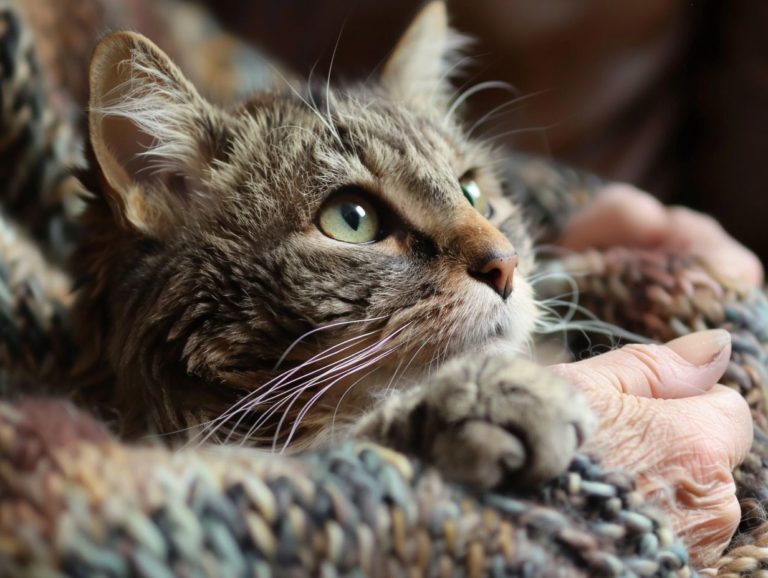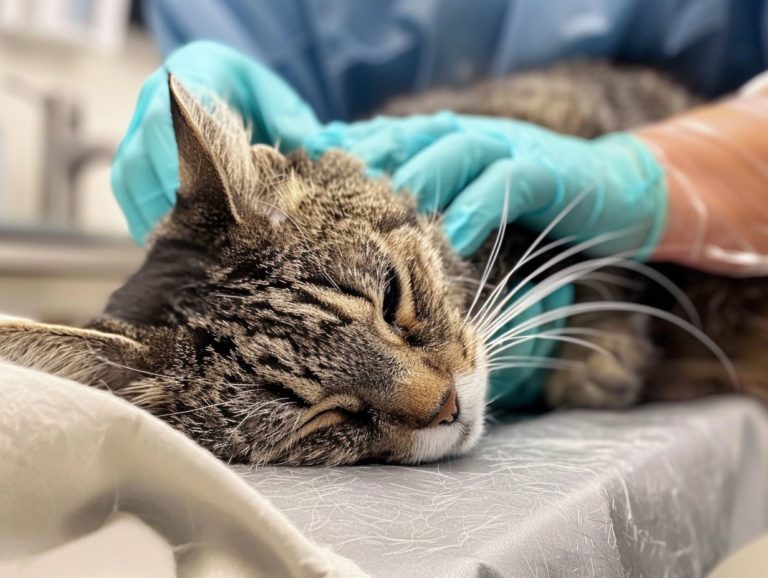How To Advocate For Your Senior Cat During An Insurance Claim
The challenges of caring for senior cats include overcoming their medical needs with insurance coverage, understanding the physical and behavioral changes they experience, and navigating the insurance claim process.
Key Takeaways:
Understanding Senior Cats and Their Needs
Understanding the unique difficulties and challenges that senior cats face as they age is crucial for meeting their needs effectively. This includes an increased likelihood of developing medical conditions such as dental disease, chronic conditions like kidney failure, and cognitive problems such as feline dementia.
Senior cats require specialized veterinary care to maintain their quality of life and address the specific challenges associated with aging. Dental health becomes a significant concern for senior cats, as untreated dental issues can cause pain, infection, and malnutrition, impacting their overall well-being. Chronic illnesses, such as kidney failure, are prevalent in older cats and can severely affect their health. Cognitive dysfunction, akin to dementia in humans, is common in senior cats and can result in confusion and disorientation.
By recognizing and addressing these specific needs through regular veterinary check-ups, tailored nutrition, and providing an engaging environment, the quality and longevity of life for senior feline companions can be significantly enhanced.
Physical and Behavioral Changes
Physical and behavioral changes in senior cats, including weight loss, changes in behavior, and the need for specialized nutrition, dental care, and regular blood work, require preventive care to ensure the overall health of aging cats.
As cats age, their metabolism may slow down, potentially leading to weight gain and obesity, which can significantly impact their health. Behavioral changes such as increased vocalization, decreased activity levels, or alterations in sleep patterns can signal underlying health issues.
Providing appropriate nutrition tailored to their age and specific health requirements, along with regular dental check-ups to prevent dental disease, is essential. Routine blood work can offer crucial insights into age-related diseases before they manifest clinically, enabling early detection and intervention to enhance the quality of life for senior cats.
Importance of Insurance for Senior Cats
The importance of insurance for senior cats lies in providing financial coverage for their medical needs when they need it the most. This coverage ensures that senior cats can receive necessary medical attention without facing a heavy financial burden, which becomes crucial as cats age and the likelihood of health issues increases.
Owners with insurance can take their older cats to the veterinarian for regular check-ups, preventive care, and unexpected medical emergencies without worry, knowing that their cats have access to treatments, medications, and procedures that might otherwise be financially challenging to afford. To learn more about insuring your senior cat legally, click here.
Insurance for senior cats offers a proactive approach to medical care for aging felines and helps in effectively managing the various challenges that come with aging pets.
Coverage and Benefits
Understanding the coverage and benefits of pet insurance for senior cats involves knowing what the policy covers, including chronic conditions, dental issues, and other age-specific conditions. According to Liz Bales, VMD, comprehensive coverage is crucial when considering senior feline care.
Pet insurance policies for senior cats offer a range of coverage options tailored to their specific needs. These policies often include coverage for common chronic conditions in older cats like kidney disease, arthritis, and diabetes. Dental care plays a vital role in senior feline health, and some pet insurance plans cover dental treatments such as cleanings and extractions.
By including coverage for these age-specific conditions, pet owners of senior cats can ensure their pets receive necessary care without facing excessive financial burdens.
Steps to Take When Filing an Insurance Claim
To increase the likelihood of a successful insurance claim for your senior cat, it is important to take steps such as:
- Documenting veterinary visits
- Providing essential information
- Seeking guidance from experts like Liz Bales, VMD
Proper documentation of veterinary visits is crucial as it acts as proof of the care given. Gathering necessary information and organizing important documents like medical records, veterinary invoices, and prescription details will streamline the claims process. Seeking advice from professionals like Liz Bales, VMD, will help in understanding intricate insurance procedures and ensuring a comprehensive claim submission. Being proactive in these steps can enhance the chances of a successful insurance claim for covering your senior cat’s medical requirements.
Gathering Necessary Information
To file an insurance claim for senior cats, essential information includes details of the insurance coverage, recent blood chemistry test results, and T4 test findings for thyroid evaluation. Emphasizing the significance of thorough documentation, Liz Bales, VMD stresses the importance of having detailed insurance coverage information as it directly impacts the coverage of medical expenses for senior cat care.
Blood chemistry test results are crucial for diagnosing underlying medical conditions, while T4 test findings are essential for evaluating thyroid function. Providing these details to the insurance company is necessary for processing your claim. The more comprehensive and accurate your documentation, the greater the likelihood of maximizing your insurance benefits and ensuring proper care for your senior cat.
Submitting the Claim
Submitting a claim for pet insurance coverage for senior cats involves liaising with the insurance provider, submitting all necessary documents, and ensuring prompt communication with the veterinary care team. Expert advice from professionals like Liz Bales, VMD, can streamline the claim process.
Clear communication is key in this process; make sure to provide all relevant medical records, invoices, and any other requested paperwork to support your claim. It is also crucial to maintain open dialogue with both the insurance company and the veterinary staff to ensure a smooth and efficient process. Being proactive and responsive can help expedite the approval and reimbursement process for your senior cat’s medical expenses. The more transparent and detailed your communication, the better chance you have of a successful insurance claim submission.
Common Challenges in Claiming Insurance for Senior Cats
When claiming insurance for senior cats, common challenges include issues related to pre-existing conditions and coverage limitations. Proactive management of these challenges is necessary to ensure comprehensive healthcare for older cats.
As cats age, they are more prone to developing a variety of health problems, which may be considered pre-existing conditions when seeking insurance coverage. Understanding what constitutes a pre-existing condition and how it can affect an insurance claim for your cat’s health issues is essential.
Many insurance policies impose specific coverage limitations on senior cats, such as exclusions for certain treatments or diseases. To address these issues, pet owners should carefully review policy terms and conditions, consider purchasing additional coverage or riders for specified conditions, and maintain comprehensive medical records for their cats.
Pre-existing Conditions
Regarding pet insurance for senior cats, pre-existing conditions can pose challenges, particularly in managing chronic conditions and ensuring regular dental assessments. Dr. Liz Bales, VMD, emphasizes the significance of maintaining clear communication with your insurance provider.
Understanding the implications of pre-existing conditions in senior cats is essential for pet owners to navigate the claims process effectively. Chronic diseases like switch insurance providers for your senior cat often require ongoing care, potentially impacting insurance coverage.
While regular dental assessments are crucial for the overall health of senior cats, they may also uncover pre-existing conditions that complicate the claims process. Open dialogue with your insurance provider regarding your cat’s medical history and pre-existing conditions can help prevent conflicts and facilitate quick and efficient claims processing.
Coverage Limitations
Understanding the coverage limitations of cat insurance for senior cats is essential for managing expectations regarding illnesses like urinary tract infections and potential exclusions. As advised by Liz Bales, VMD, this involves a careful review of policy terms.
Senior cats frequently experience various health issues, underscoring the importance of comprehending any restrictions that insurance policies may impose to prevent surprises during the claims process. Common limitations pertain to urinary tract infections, alongside exclusions for pre-existing conditions or specific treatments.
For seniors, knowing what a policy includes and excludes is crucial. By thoroughly examining policy terms, pet owners can make informed decisions to provide the best care for their aging feline companions.
How to Advocate for Your Senior Cat During the Claim Process
Advocating for your senior cat during the insurance claim process involves communicating with the insurance company about the value of your senior cat’s care, consulting with experts like Liz Bales, VMD, and utilizing comprehensive resources for senior cat care. This advocacy is crucial for obtaining the best possible support for senior cats in their care.
By maintaining open communication with your insurance provider, you can ensure that your senior cat’s unique needs are taken into account during the claim process. Collaborating with specialists such as Bales can offer valuable insights to help create a tailored care plan for your senior cat. Leveraging resources such as senior cat health guides and online forums can provide the necessary knowledge and tools to effectively navigate the insurance claims process and advocate for the well-being of your feline companion.
Communicating with the Insurance Company
When communicating with the insurance company to secure coverage, it is essential to provide detailed information about veterinary treatment, wellness plans, and specific health requirements for senior cats. Dr. Liz Bales, VMD, emphasizes the importance of clear communication channels. Understanding your senior cat’s complete medical history, current health status, and specific wellness needs enables you to convey this information to the insurance company effectively.
Highlighting the benefits of wellness plans, especially for senior cats, showcases a dedication to proactive care and prevention. Transparent communication necessitates recognizing the significance of veterinary-specific details in maintaining the overall health of your senior cat.
Seeking Support from Veterinarians and Other Pet Owners
For the efficacy and success of pet insurance claims for senior cats, seeking support from veterinarians and other pet owners is crucial. This is essential for managing age-related problems and promoting ideal pet health. Liz Bales, VMD, recommends collaborative care approaches. Veterinarians can provide valuable input to help pet owners understand the specific requirements of their senior feline companions and develop the best care plans.
Fellow pet owners who have had similar experiences can offer emotional and pragmatic support, creating a community of support. This not only makes it easier to deal with the challenges associated with making claims but also ensures that the health of senior cats is managed in a holistic manner that combines medical professionalism and shared experiences. Adopting community-led care models can improve outcomes for aging cats by enhancing their quality of life.
Frequently Asked Questions
How can I advocate for my senior cat during an insurance claim?
There are several ways you can advocate for your senior cat during an insurance claim. First, make sure you provide all necessary medical records and documentation to support your claim. You can also enlist the help of your veterinarian to provide additional evidence. Additionally, be persistent and don’t be afraid to ask for updates on your claim status.
What should I do if my senior cat’s insurance claim is denied?
If your senior cat’s insurance claim is denied, don’t be discouraged. You have the right to appeal the decision and provide any additional information or evidence that may support your claim. It may also be helpful to seek advice from a pet insurance specialist or advocate.
What can I do to ensure my senior cat’s insurance claim is approved?
To increase the chances of your senior cat’s insurance claim being approved, make sure you have a thorough understanding of your policy coverage and limitations. Keep all medical records and documentation organized and up-to-date, and be sure to follow any guidelines or requirements set by your insurance provider.
How long does the insurance claim process typically take?
The length of the insurance claim process can vary, but it typically takes between 2-4 weeks. This can depend on the complexity of the claim, the responsiveness of the insurance provider, and any additional information or evidence that may be required.
Can I advocate for my senior cat if I am not the policyholder?
If you are not the policyholder but are responsible for your senior cat’s care, you can still advocate on their behalf during an insurance claim. However, you may need written authorization from the policyholder in order to access medical records and information related to the claim.
Are there any resources available to help me advocate for my senior cat during an insurance claim?
Yes, there are resources available to help you advocate for your senior cat during an insurance claim. You can reach out to pet insurance specialists or advocates who are knowledgeable about the claims process and can provide guidance and support. You can also consult with your veterinarian for advice and assistance.


